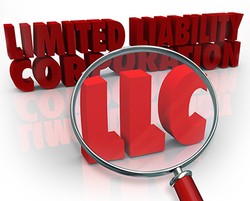
How to Start an LLC
by mhoppal
The LLC, or Limited Liability Company, is a popular-yet-complex business structure in the United States. This article focuses on how to start one.
What is an LLC?
An LLC is somewhat self explanatory, but the concepts that are explained can be difficult to grasp for those who haven't become experienced in the business lexicon.
A few main features of an LLC are:
- Multiple potential owners;
- Limited financial liability for those owners; and
- Ease of use, compared with corporations.
Ownership
Depending on your state's individual laws, an LLC can be started with as few people as one (That is, one member or owner). This makes it possible for freelancers to file as LLCs instead of claiming themselves as sole proprietors, meaning they are eligible for the associated limited liability.
However, in contrast to a proprietorship, the LLC is a structure allowing for multiple owners - though not as many as a corporation.
Limited Liability
LLCs come boxed with limited (financial) liability. If the company appropriately takes on loans or other debts, or if it is sued and loses in court, then the members of the LLC are not financially liable for the company's debts.
A note: it is still possible to assume financial responsibility if you own an LLC. If you do take on debts, make sure you are doing it in the name of the company, and not in your own name.
Relative Ease
Corporations come with an insane amount of paperwork and headaches. LLCs are simpler, while still providing the limited liability many new entrepreneurs seek.
Filing the Paperwork
Assuming you have your idea and other things prepared, your first step will be to file with all the appropriate places.
Get Your EIN
The IRS gives out a free identification number to all employers and potential employers. Filing for this number is your first step.
While not all states require an EIN to form an LLC (unless you have employees), it is still helpful to have, as most do require it and you will need it to obtain most insurance products, to be eligible for certain programs, and sometimes to receive financial assistance. Additionally, some sources conflict as to whether it is mandatory, federally. It's safer to get it.
The EIN is easily obtained through the IRS website.
Identifying your states
Where you choose to incorporate your LLC will probably depend on either your geographic location, where your business has the most volume, or which state offers the best laws applicable to your company.
I chose to file mine where I lived at the time because it was the simplest. However, you need to note that you may be required to file as a foreign LLC in any state where you do a significant amount of business. Each state varies in its definition of 'significant,' so do your research. If you are required to file, do it sooner rather than later, and be prepared to pay the filing fee.
Choosing your name
Choosing a name for your LLC is an act of creativity and logic. This name is only a formality. You are always able to use a different name in operations through a DBA (or Doing Business As) name, which is less formal.
Keep in mind this name needs to be unique and be prepared to search through your Secretary of State's records (which should be online and freely accessible).
Most states will prefer (or mandate) that you include an LLC-specific tag on the end of your business's name. Examples of these are LLC or Limited Liability Co.
File Your Articles of Organization
To do this, you will need to determine a few things. You will need to know who the initial members (owners) are, who the agent is (that is, the person speaking on behalf of the organization in this instance), the agent's contact information, and, of course, the name and a statement of purpose.
In providing your initial members' names, keep in mind that these records are public. Some recommend avoiding revealing these names unless required by the state. Others don't find it significant. It's your choice.
The Articles of Organization will be filed with the Secretary of State's office, or with another applicable office.
Get your State Tax ID
State tax identification numbers are required in many states, such as New Mexico, that have a gross receipts tax or another tax besides sales tax. Often, the office in which you file your articles of organization will tell you if you need a state tax ID.
Operating your LLC
Optional, but strongly encouraged, is drawing up papers constituting an operating agreement. An operating agreement is not generally used for one-member LLCs, but it is recommended for those with multiple managers or members.
A typical operating agreement often declares capital investments of each person involved and how much ownership he or she can claim over the company. It will also often have a split of profits or losses among the members.
Operating agreements can also contain dates of meetings, procedures for removing managers, and buy-sell rules.
Finally, figure out your tax rules.
For LLCs owned by natural persons - that is, you and I - the tax year MUST match that of the LLC's owners. That means if you start an LLC, your LLC's tax year will end on December 31 and taxes will be due on April 15.
You may also note in the process for filing that you can change your LLC's tax status. This means it can be taxed in pass-through form, such as a partnership, or as a corporation, or even an S-corp. Consult with your accountant to figure out which would be most beneficial to you, but note that the most standard taxation is that of pass-through form, where you report your portion of the profit (or loss) on your personal income taxes.
You might also like
5 Steps to Starting Your Own BusinessMillions of people dream of the day when they will become their own boss. Man...
What is Limited Liability and Why Do I Need it?When you incorporate or form an LLC, you gain a huge benefit called "limited ...
Limited Partnership vs LLC: Which One is Right for Me?Are you forming a business? The most important step is choosing the right typ...



 10 Secrets to a Better Hotel Roomon 12/16/2012
10 Secrets to a Better Hotel Roomon 12/16/2012
 Buy Computerized Sewing Machineson 11/19/2011
Buy Computerized Sewing Machineson 11/19/2011
 Home Designer Gift Guideon 11/19/2011
Home Designer Gift Guideon 11/19/2011
 Business Casual: Building a Successful Wardrobeon 11/19/2011
Business Casual: Building a Successful Wardrobeon 11/19/2011



Comments